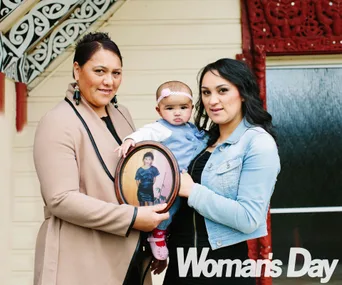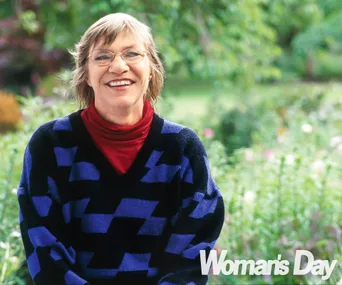Hanging on a bedroom wall in Laurie Anderson’s brick-and-tile home in Christchurch is a precious family portrait. Taken in 1995, it shows Laurie, his partner Angela Blackmoore and her toddler Dillon smiling self-consciously at the camera, their whole lives ahead of them.
“We were a little family and family is everything to me,” says Laurie, now 51. But a week after the trio posed for that portrait at a photographic studio, 21-year-old Angela was dead.
Laurie came home from work at 11.20pm on the night of August 17, 1995, to find his partner lying in the kitchen, face-up in a pool of blood. Angela, who was 10 weeks pregnant, had been stabbed 39 times in a frenzied knife attack. Her two-year-old son Dillon was asleep in his bed.

The family posed for this portrait just a week before Angela was killed. Laurie found the photo, which she had hidden in the house as a surprise, after her death.
Despite a police investigation spanning two decades, the killer is still at large – and many questions remain unanswered. There was no sign of a break-in and a murder weapon has never been found.
Laurie says Angela was extremely safety-conscious and it was the first time he had left her on her own at night. “At 3.30pm that day, I got a call saying I needed to head in to work,” tells Laurie. “No-one knew she was going to be alone that evening.”
The couple’s boarder had moved out a week earlier. More than 21 years on, Laurie can still remember the eerie feeling of entering the home they shared. “The front door was closed and locked,” recalls Laurie. “I walked into the living room. The TV was on. Everything seemed normal.”
On the way through the living room, he picked up a piece of leftover pizza and took a bite. “Then I saw Angela in the kitchen on the floor. I panicked. There was a lot of blood.”

Cuddling little Dillon, aged about 18 months.
The day before, Angela had picked up the family portrait and hidden it in the house to surprise him. Laurie didn’t find it until after her death.
He says the knowledge that Angela met such a violent end has been hard on him and also on Dillon, who’s now 23. Their grief has been intensified by the frustration of not seeing anyone held accountable.
“I still think of Angela and I think of what could have been,” reflects Laurie. “But it’s important to get on with life.” Laurie still lives in the home on Vancouver Crescent that Angela was murdered in.
“The house didn’t kill her – someone in the house did,” explains Laurie.

Angela and Laurie at Fox Glacier about five months before she died.
“I love this place. We had a lot of happy memories here.”
His stepson Dillon lives not far away with his fiancée. On Dillon’s wall, there is a copy of the same studio portrait taken when he was a toddler.
Laurie and Dillon are close – not a week goes by where they don’t catch up. For Laurie, it doesn’t matter that Dillon isn’t his biological son or that he knew him for only seven months before Angela died.
“When I took on Angela, I took on Dillon,” he tells. “This is my family.”
When Laurie met Angela in 1994, she was in the process of separating from Dillon’s dad. It had been a difficult relationship and she was in need of a friend, says Laurie. “She had low self-esteem and was insecure. I always felt like Angela really wanted to be wanted.”

Laurie, Angela and her friend Carol.
At the time, Laurie was working at Canterbury University as a librarian’s assistant and in the chemistry store room. He has now been there 25 years. “I’m a hard worker. I am reliable,” he says.
The couple did a road trip around the South Island and set up house in the home Laurie owned on Vancouver Crescent in Wainoni, Christchurch. Bit by bit, Laurie watched Angela’s confidence grow. “What I saw in her was a bubbly young woman with a unique perspective on life,” he remembers.
Angela had done a stint in foster care as a child and it was not a happy time, says Laurie. She didn’t believe she was a good mother and needed help bringing up her son Dillon.

Loving mum Angela with newborn Dillon.
“He was a full-on little boy and Angela didn’t think she could handle him,” he says. Angela had respite care for Dillon through Open Home fostering. He lived with an older couple, John and Margaret Hills, but spent the weekends with his mum and Laurie.
“Angela loved Dillon and wanted to be a good mother,” tells Laurie. “We were both working together to get full-time custody.”
The week after Angela died, the couple had been due to start a 10-day parenting course. Laurie says their life was on track and they planned to marry. They wanted to be a “real family” with Dillon and the new baby they were having together.
“We were excited about being parents,” says Laurie. “It wasn’t until after Angela died that I found out the baby was a boy. I would have had a son.”

Angela is all smiles on her son’s second birthday.
Laurie married briefly a few years back but has never had biological children. “It’s just never worked out. You have to be with the right person to bring a baby into this world.”
After Angela’s murder, Dillon stayed living with his foster parents, who have both now passed away. The couple gave him every opportunity and sent him to a private school, St Andrew’s College in Christchurch.
Dillon would often spend the weekends with Laurie and his parents, Mary and Noel Anderson.
“I coached his soccer teams – we did trips to Australia,” tells Laurie. “We tried to fill Dillon’s life with as much stability and as much happiness as possible.”
And in a strange twist, Laurie’s mother Mary married Dillon’s foster dad John when his first wife Margaret died. “So my stepson Dillon became my stepbrother,” smiles Laurie. “It was an unusual definition of family, but it worked. I know Angela would be pleased that Dillon had been so well looked after.”

Angela with her mum Pauline and grandmother.
Dillon has never been interviewed by the media before, but he agreed to talk exclusively to Woman’s Day as long as his identity isn’t revealed. He changed his name to Dillon when he was a teenager. A qualified graphic designer and budding filmmaker, he is engaged to marry his long-term partner.
Dillon reveals since he was very young, he’s known his mum was murdered. “It’s my normal – it’s all I’ve known.” He says his family never hid anything and always answered his questions honestly. While he doesn’t remember his mother, he has put together some memories from stories and photos. “Because I never knew her, she doesn’t feel real sometimes,” he tells.
Talking to Woman’s Day with Laurie by his side, Dillon admits he had an unusual childhood but not an unhappy one. “I’ve had three mothers and all of them have died,” he reveals, referring to Angela, then his adoptive mothers Margaret and Mary.

Dillon, aged three or four, at his mum’s gravesite.
His first two years were tumultuous and he was quick to anger as a young boy. “You were a handful and you would hit out,” recalls Laurie.
Dillon adds, “I apparently used to run up to people and thump them on the chest with both fists. My adoptive father John had to teach me how to hug people.”
Dillon says one of the things he finds hardest to accept is the loss of his unborn brother. “I’ve always felt alone and I would have loved a sibling,” he tells.

Dillon in a St Andrew’s school uniform, aged about six.
However, he knows how lucky he is that good people like Laurie have given him consistency and support. “I know now that a father is not just someone who gives you life – it is someone who takes care of you,” he says.
For both Laurie and Dillon, sticking together has eased the grief of the past 21 years. They both hope Angela’s killer will be found but try not to dwell on getting closure. “Life must go on,” insists Laurie.
In the early days, Laurie’s suffering was compounded by the fact he was closely scrutinised as a possible suspect. “I was told that in these cases, 90% of the time it’s the partner,” he explains. “That made me mad.”

Now 23, Dillon and his stepdad remain close. “He’s doing really well,” says Laurie. “Angela would be proud.”
Over the years, the cold case also had a huge effect on Angela’s mother Pauline Keen. She fought relentlessly for justice, but it eventually took a toll on her health. She died in 2010.
Laurie says he hopes whoever killed Angela knows how many lives they’ve disrupted. “They didn’t just murder Angela – they took the life of my unborn baby and took Dillon’s mother away from him.”
While it would be easy to live the remainder of his life being resentful, Laurie reveals he would rather focus on the future and on doing the right thing by Dillon.
“We have our lives ahead of us and we need to stay focused on living them,” he says. “Despite all he’s been through, Dillon is doing really well. I know his mother Angela would be really proud.”



